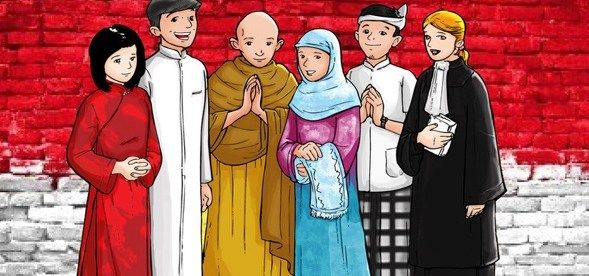Tolerance, Social Identity and Religious View in Diversity in Indonesia

The attack on Church of St. Lidwina Bedhog Trihanggo by a young man recently in Yogyakarta confirmed that what had been said by Prof. Rocky Gerung, Lecturer of Philosophy FIB UI is true that:
So far in Indoensia, tolerance is merely the tundown of oligarchs of soleh and cartels of those who want to enter paradise. That is, tolerance is still sky high. Therefore, urgent to immediately ease tolerance.
Being tolerant can not only by studying books, understanding Pancasila theory, let alone just reading the scriptures. Moreover, we must explore life, measure its depth, then greet ourselves and seek a balance so as not to get lost between blind love and hate.
Tolerance is an awareness that in this life diversity lives and grows in the midst of the religious. And this is a necessity because in this country become pluralism grow naturally since this nation stands.
Furthermore, in the life of a nation and state a tolerant attitude should be a social identity that everyone must possess. Because we are a multi ethnic nation, religion and social background.
But the opposite is true, today many people assume that social identity is just a label. He simply serves as a tool to help others recognize who he is.
No wonder because inside the Identity Card (KTP) or other identity markers, we are always asked to include one or more social identities at once. What is your gender, what is your profession, what is your religion, and so on.
In fact, research conducted by hundreds of psychologists who study social psychology for more than half a century has shown how social identity greatly affects many aspects of a person's mentality. Social identity shapes the way we think (cognitive), feel (affective), and how we react to all kinds of events in everyday life.
According to John C. Turner, et al., (1987). When someone adopts a social identity, in fact he does not just put a new label on him.
Moreover, it is dissolving into its mental system all kinds of preferences, values, historical narratives, and emotions attached to that identity. Thus, the thicker a person uses a particular social identity, the stronger the influence of identity is embedded in his mental system.
It was Suliyono, a sharp-armed man from Banyuwangi, East Java, who snatched his sword towards the congregation of St. Lidwina Bedhog Trihanggo. He also swung his sword around and destroyed the statue of Jesus and the Virgin Mary in the pulpit.
As a result of his actions, five people were injured, including Father Karl Edmund Prier who was the leader of the mass and Ajun Inspector Satu Munir, the Gamping Police personnel who came to arrest the perpetrators.
In a case like this, the most basic question is why does a Suliyono do the action? And why people with views like him tend to find it hard to accept the idea that we, as individuals, should establish a pluralistic social identity within the context of religious diversity.
And this identity will easily find points of contact with many different people. Thus, potential conflicts can be mitigated from the beginning. But for him and other extremists, the opposite is true that the action is part of the global pan-Islamic identity completely defines their existence.
Furthermore, in their mental system, this pan-Islamic identity is so dominant, even a single identity (mono identity) that eliminates all other alternative identities (eg national identity, ethnic identity, or identity as part of humanity).
So, no wonder, every war, conflict, and violence involving Muslims in any hemisphere automatically automatically perceive them as a threat to their own existence. Through that single identity, the anger and resentment that initially exploded in conflict locations could spread everywhere, across the territorial boundaries between countries.
On the other hand, for Suliyono and those with the same view, they only see social reality rigidly and simplistically. They tend to perceive the world from our narrow goggles or them, and negate the existence of our inclusive category, which can break down plural plural societies (Fuad Hassan, 2002).
This hateful act of violence and hatred is precisely because of the interaction of the group, not the private person. This interaction then leads to fanaticism and hatred. If tolerance is an awareness that we must accept differences. Then,this consciousness will only happen if we dive into the sea of compound life.
However, on the other hand, in our individual nationhood lives we have no identity other than the identity of the community, both ethnic, racial and inter-group religions. For in the perspective of the constitutional verse, Religion is only a record of the administration of the State. While the individual will lose excitement in the community if he does not blend in it.
Being a communal part of this country is a thing to be acted upon by someone because this country has given the community capital that its traditions, feudalistic and religious theorems.
However, let us not be too fanatical in the perception of the scripture because if it happens we will not open ourselves to accept another religion. What happens is that the State then only suplusions and deficits of reason, exactly what Prof. gerung. We should also be aware that diversity in diversity is a destiny that has been predestined by God.
Therefore, we should not condemn, let alone alienate something different outside our people. In the life of the nation and the state we should appreciate the diversity and diversity that flourish like the flowers that grow in the fields that make it beautiful. Because it must be guarded by us all.
Out there, there is another Suliyono that is important for us to realize together in a social ikhitiar to together citizens to build this nation. We need social movements that enlighten the minds of single adherents. That way, diversity and diversity will continue to live and be preserved in this country.